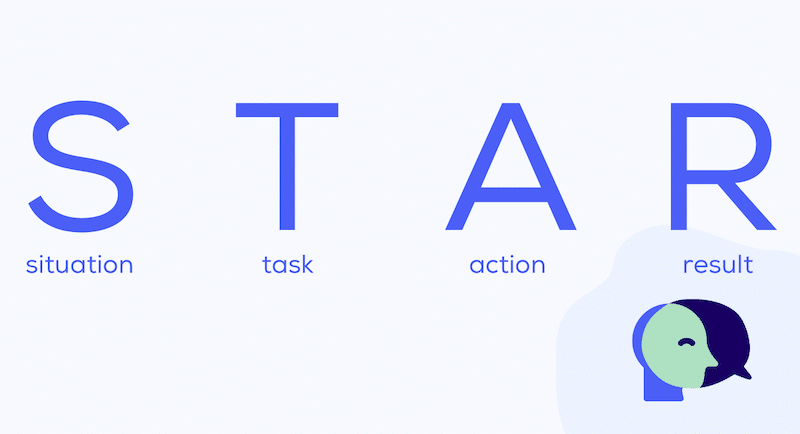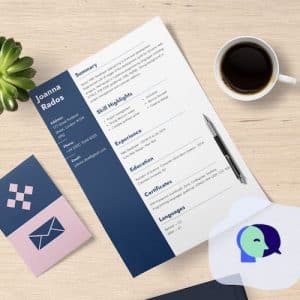Common interview questions and possible answers
So, you’ve caught your prospective employer’s eye and you have been shortlisted for an interview. Just like your resume, it is well worth putting in some time and effort to prepare beforehand to give yourself the best chance at success!
Interview questions can seem relatively simple, but when we are put on the spot, it can be difficult to clearly express what we want to say and we can find ourselves jumbling words and not getting to the point.
Prior to your job interview, it is highly recommended to become familiar with some common questions you are likely to encounter. By practising your answers, you can organise your thinking and have some rough responses in your head ready to use.
Doing a practise interviews for online and in-person meetings can also help to reduce anticipation when you go in for the real thing. To know what to say, and what not to do.
The STAR Technique

The STAR technique is a great way to make sure you are providing specific and concrete evidence of your skills and experiences. This will help the interviewers to understand how you have previously matched the assessable competency. To do this, make sure you answer the questions using the following STAR technique to structure your answers.
SITUATION – Outline the context and describe the situation
TASK – Describe the task that was required
ACTION – Describe what action you and others took
RESULT – Explain the outcome of your action
Job Interview Question Types

In a job interview, you are likely to encounter 3 types of questions:
- Situational questions
- Competency-based questions
- Behavioural questions
Situational Questions
Situational interview questions are based on specific scenarios that could occur in the role. Questions will involve a hypothetical situation and require you to explain how you would handle it. Situational interview questions can be difficult to answer because you are required to think and respond quickly and specifically.
Try to take a moment to understand what you’re being asked before answering any situational questions. For example, is the interviewer looking for evidence of your organisation skills? Or do they want to find out how you manage conflict?
Example situational questions:
- A client has unreasonable expectations for a product or service and is not happy. What do you do?
- What would you do if you initially gave a client a delivery timeline but soon discovered that you were unable to deliver on time?
- Imagine that you’re working on a large project with multiple parts. How would you approach it?
Situational question and possible answer
Question – What would you do if you initially gave a client a delivery timeline but soon discovered that you were unable to deliver on time?
Answer – This actually happened to me once in my current job. I had told the client that it was a simple task, and estimated it would take two weeks to complete it. But due to unforeseen circumstances, a co-worker became ill so I had to take on some of their work which meant my clients job would need to be push back a week.
As soon as I realised the situation, I emailed the client explaining the situation and apologised that their job would be pushed back one week. In the email, I also said that because I wasn’t going to deliver on the original deadline as promised, I said we would give them a free upgrade on their service. This meant the client was happy as a result, as they would be getting something extra. I made sure that I then delivered on the second, new deadline that they were given.
Competency-based questions
A competency–based interview is an approach used by interviewers to assess a particular key area or skill. They will often ask you to recall an example from your past experience and require you to provide a specific example to demonstrate your capability. Some common competencies may include:
- Teamwork/collaboration
- Problem solving
- Organisation
- Decision making
- Openness to change
- Communication
- Conflict resolution
Common Competency-based questions:
- Describe a time when you solved a difficult problem at work?
- How do you juggle high-priority competing projects?
- Can you give an example of when you have supported change within an organisation?
- Describe a time when you managed an under-performing member of staff?
- Tell me about your strengths.
- Tell me about your weaknesses.
- What have been your greatest achievements to date in the workplace?
Competency-based question and possible answer
Question – Tell me about your weaknesses.
Answer – I’m a people pleaser. Some might think this is not a weakness, but in the business world, it really is – as it means I struggle to say no to people. If I said yes to everything a colleague or client wanted, then I wouldn’t achieve the goals that I have set. I have been working on this weakness by seeing a Mindfulness Coach. I have been learning that I don’t need to be liked by everyone, as in life and business we can’t. So I have been learning to say ‘no’.
Behavioural questions
Behavioural interview questions are a great way for the interviewer to get to know you as a candidate. By assessing how you responded in a particular historical situation, they can gauge your level of stress, your skills, and how you would conduct yourself in a professional environment. This also allows the interviewer to get a much better understanding of your as a person.
Common behavioural questions:
- Describe a situation where you encountered a difficult stakeholder.
- Tell me about a time where you had to meet a very tight deadline.
- Describe a time you had competing priorities and how did you manage it?
- Have you ever faced conflict or disagreement with a co-worker? What happened and how did you resolve it?
- How do you respond to high-pressure situations?
As you can see, each type of questioning from the interviewer has the objective of eliciting specific forms of evidence to help assess you as a potential employee. In addition, we have listed some of the most common questions you are likely to encounter:
Tell me a bit about yourself.
The aim here is to gain an understanding of who you are and your professional background. An opportunity to show your unique qualities as well as your formal qualifications.
Why do you want to work here?
Employers want to gauge your motivation for the role and also how much you know about the company which gives insights into how much preparation you have done.
Where do you see yourself in five years?
This can be a tricky question as the interviewer is trying to assess whether you see yourself growing in your role and within their company. Make sure your answer aligns with the relevant department structure that you will be entering and the Company’s vision.
Why should we hire you?

This is a loaded question and can be a difficult one on the spot as many of us are not comfortable selling ourselves. This is an opportunity to summarise your experience, skill set and fit for the company. It’s your chance to set yourself apart from the competition.
Do you have any questions for us?
Prepare one or two questions in advance that show your understanding of the industry you are working with. It helps to level the playing field and show that you are knowledgeable and interested in the specifics of the role, not just getting ‘a’ job. The questions may open up some deeper professional conversations that can leave a lasting impression.
Behavioural question and possible answer
Question – Tell me a bit about yourself
Answer – Before I worked in business coaching, I was actually a yoga teacher for 5 years and ran my own yoga studio with 5 staff. I ended up selling my company, and started coaching other business owners to empower them to take charge in the running of their businesses. Coming from a wellness background means I bring this into my practice. I still take time for myself and exercise before work daily – this creates a fresh mind and outlook for the day.
Wrapping up
It is helpful to remember that all interview questions are an opportunity for you to demonstrate your skills, behaviours and experience. By pausing to identify what might be being asked of each question, you can tailor your answers to ensure you are providing the best evidence possible to secure the job!
Written by Emma Moore. Based in Bayside in Melbourne, Emma has spent 15 years in Corporate Talent Acquisition roles in global organizations across Consulting, Professional Services and Telecommunications. Emma has tertiary qualifications in Psychology, Business (Human Resource Management) and Careers Development and Education. Emma has read and provided feedback on thousands of resumes, interviewed hundreds of candidates and made those all important hiring decisions with her stakeholders. Emma is in a unique position to enable you to represent yourself in the best possible way. She knows exactly what prospective employers like to see and hear throughout the application and interview process as a result of being ‘on the other side of the fence’ for so many years.
Want to work with Emma? She can fix your resume for you! Contact her today to set up a CV, Resume, LinkedIn or Interview Coaching session. Emma can work with you in person or remotely.


